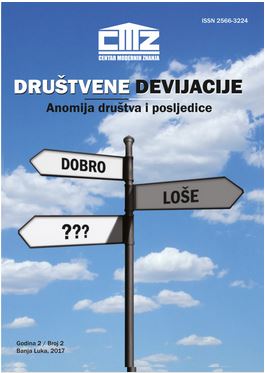SOCIETY AND ANOMIE. SOCIOLOGICAL ANALYSIS OF INTELLIGENCE AND OPERATIONAL POLICE AND BORDER GUARD WORK IN THE BALTIC SEA AREA
SOCIETY AND ANOMIE. SOCIOLOGICAL ANALYSIS OF INTELLIGENCE AND OPERATIONAL POLICE AND BORDER GUARD WORK IN THE BALTIC SEA AREA
Author(s): Goran BašićSubject(s): Social Sciences, Sociology, Social development, Social differentiation, Studies in violence and power, Social Norms / Social Control
Published by: CENTAR MODERNIH ZNANJA
Keywords: society; anomie; intelligence police work; ethnography; operational police work; moral; identity; solidarity; social cohesion; ritual;
Summary/Abstract: Resolution of the prevailing norms in a society in the context of war, occupation, anarchy, and takeover by criminal forces dispels the old norms but also sets new norms, which in turn can be quickly dispelled. Anomie can be understood as the core of society, as a kind of “pulsating moral destructiveness” that no one really can control but that paradoxically produces social order. Anomie does not arise from nothing, from the void; it is the product of the interactive dynamics that arise when individuals come together, acting as a propellant to lead individuals to meet. Émile Durkheim’s attention goes to how interpersonal interaction is creating changes in society, often showing the various pathological features that can lead to frustration and conflict. The individual’s quest to liberate himself from the collective as a result has a rootlessness and isolation. When the old network dissolves, it becomes impossible to maintain the old norms and values. The individual is no longer limited by the rules of morality and authority. Instead, the individual may develop a pattern of constantly exceeding all limits because the collapse of the former social control coincides with the development of the system that requires constant growth of individual needs. The product of such interactions is a state of society where there is uncertainty about the values, goals, and norms. Durkheim refers to this state as “anomie”.Durkheim analyzes deviation from the norm (as well as individual and societal response/reaction to the norm deviation, such as punishment) as an integral part of the issue of solidarity and social cohesion. The moral order in a society has a fundamental value according to Durkheim because individuals are both integrated with and controlled by the community. Durkheim saw integration as a way to tie the individual to the community through shared attitude, solidarity, and rituals. He saw control as a compelling force that binds the individual to the norms through the judicial system, laws, and sanctions. Durkheim defines a deviation from the norm as an act that offends a strong and definite collective consciousness. Thus, the acts are antisocial in that they violate norms and values that are important to the social unity. The work of intelligence and operational police and border guards in the Baltic Sea area (Sweden, Finland, Estonia, Lithuania, and Latvia) is characterized by the norm-creating and re-creating rituals from the first moments of the day: from the morning coffee and the first information exchange with an intelligence partner to operational actions in the form of surveillance or control of individuals and/or cars. These interactions are characterized by a strong desire to preserve the prevailing social order. In relation to the threat to the prevailing norms, there also are normative rituals. For example, in these interactions, “norm-dissolving Russians” are constructed who are not physically present in the situation but who are important in the relationship as invisible sacred objects. The making of the category “norm-dissolving Russian” in which Russia/Russians are used to dramatize the "other" is made visible in the empirical material when actors in the study describe (1) criminal Russians, (2) Russian espionage, and (3) Russian military invasion.
Journal: DRUŠTVENE DEVIJACIJE
- Issue Year: II/2017
- Issue No: 2
- Page Range: 31-40
- Page Count: 10
- Language: English

